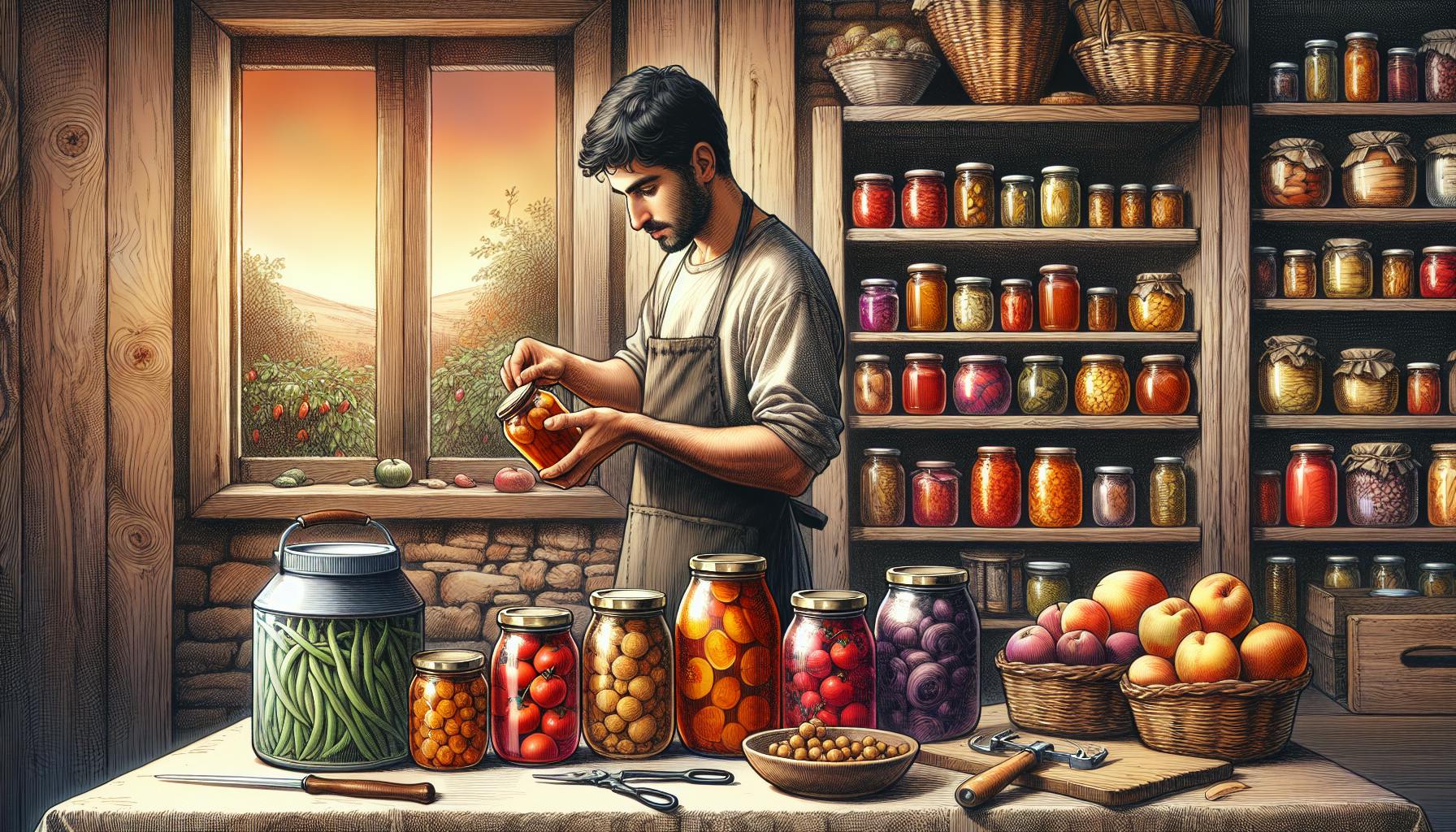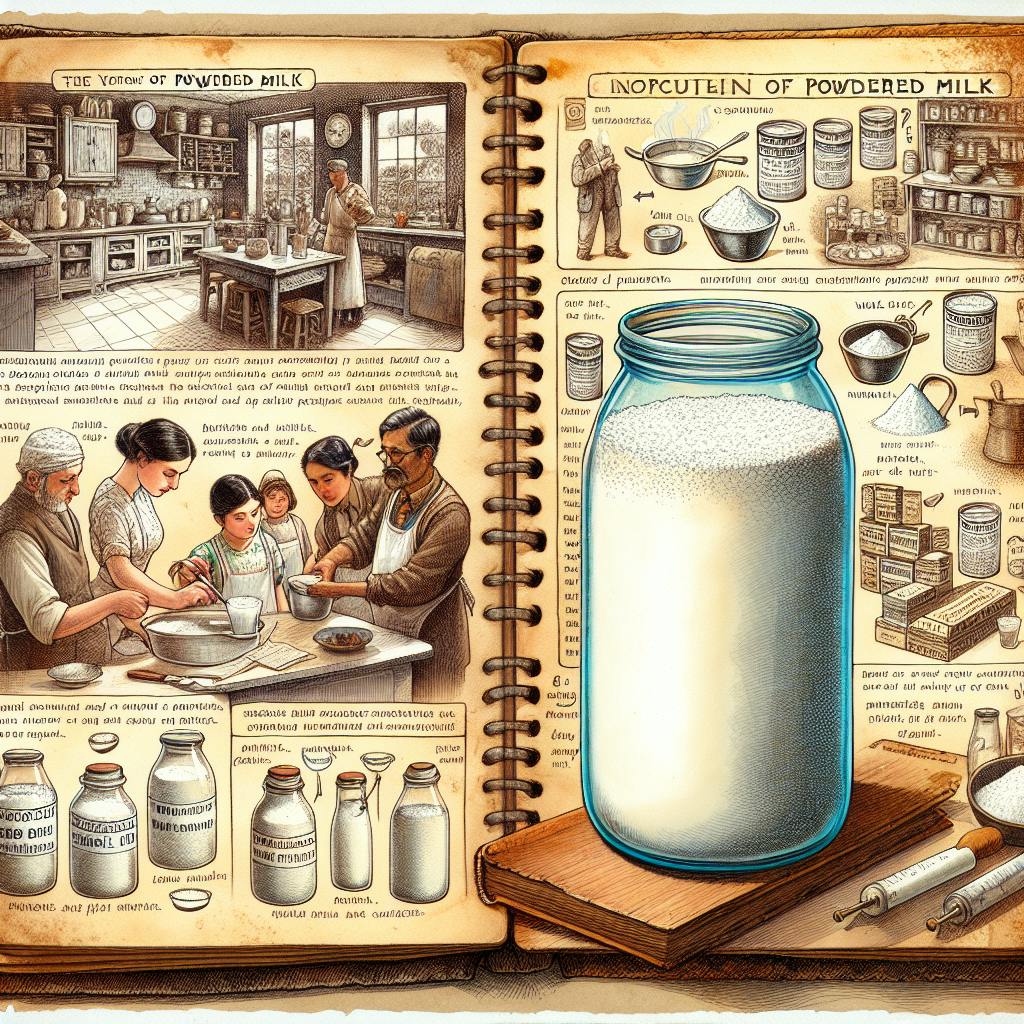When building an emergency food supply, most people would agree that choosing organic options is ideal for health and nutrition.
By exploring the essential organic foods to stockpile and proper storage methods, you can create a survival stockpile that will keep your family nourished in any crisis.
In this guide, you'll discover the best nutrient-dense organic staples, freeze-dried food brands to consider, as well as best practices for storing and preparing organic survival meals to get the most out of your investment.
Introduction to Organic Survival Food
Organic survival food is essential for emergency preparedness kits because it provides nutritious, chemical-free sustenance when access to fresh food is limited. As opposed to conventional survival food, organic options are free of pesticides, GMOs, hormones, and other concerning additives.
Understanding the Importance of Organic in Survival Situations
Organic food is especially significant in disaster scenarios for several key reasons:
-
Health - Avoiding toxins and chemicals keeps your body strong and resilient during high-stress situations when illness can be devastating. Organic foods provide wholesome fuel.
-
Sustainability - Organic agriculture promotes biodiversity and healthy ecosystems, which are the foundation for long-term food production if SHTF.
-
Self-Sufficiency - Growing your own organic food or sourcing it locally allows independence from large corporations and supply chains, making communities more self-reliant.
Comparing Organic and Conventional Survival Food Options
Conventional survival food is often processed and includes chemical preservatives to extend shelf life. However, these additives come at a cost for your health. Organic alternatives avoid toxins and offer superior nutritional value from wholesome ingredients. Though sometimes pricier upfront, organic foods are a smart, safe choice for when you need provisions the most. Investing in high-quality organic survival food brings peace of mind.
Best Organic Survival Food Staples
Selecting Nutrient-Dense Organic Staples
When building your emergency food supply, it's important to focus on nutrient-dense organic foods that provide essential vitamins, minerals, protein, healthy fats, and complex carbohydrates. Great options include:
- Organic nuts and seeds like almonds, walnuts, chia, and hemp - excellent sources of protein, fiber, and healthy fats
- Organic rolled oats and whole grains like quinoa, brown rice, and buckwheat - provide sustained energy and fiber
- Organic nut butters like almond or peanut butter - nutrient-dense and high in protein and healthy fats
- Organic dried fruits like raisins, cranberries, and apricots - provide antioxidants and natural sweetness
- Organic proteins like organic canned wild salmon, chicken, and grass-fed beef - buildings blocks for muscles and sustained energy
When selecting organic survival foods, check the ingredient list to ensure there are no artificial preservatives, colors, flavors or GMOs. Focus on whole, minimally processes real foods over highly processed options.
Organic Survival Food Buckets: A Convenient Solution
Pre-packaged organic food buckets provide a convenient, grab-and-go foundation for your emergency food supply. Many contain a diverse mix of staples like grains, legumes, dried dairy, proteins, fruits and vegetables. Opt for buckets with a 20-30 year shelf life.
Top picks include:
- NuManna Organic Family Pack - nutritious mix with 92 servings
- Augason Farms Emergency Food Supply - gluten-free and vegetarian options
- Wise Food Storage Organic Emergency Food Bucket - GMO-free with 25-year shelf life
Buckets allow you to store a variety of organic survival foods in ready-to-go kits. However, it's still important to supplement them with other essentials like proteins, fruits and vegetables.
The Role of Proteins in Organic Survival Diets
Getting adequate protein from plant and animal sources is crucial in an emergency situation for preserving muscle mass and providing sustained energy.
Great organic proteins to stockpile include:
- Canned wild salmon, sardines or chicken
- Dried soybeans, lentils, chickpeas and other legumes
- Nuts and nut butters
- Nutritional yeast
- Organic protein powders like pea, hemp or bone broth powder
Focus on a mix of plant and animal proteins. Plant options provide fiber and nutrients while animal proteins deliver complete proteins to support strength and performance.
Incorporating Organic Superfoods for Enhanced Health Benefits
Organic superfoods like chia, spirulina, wheatgrass and apple cider vinegar pack an extra nutritional punch. They provide antioxidants, vitamins, minerals and compounds that enhance health and wellbeing.
Great organic superfoods to include:
- Chia and hemp seeds - fiber, omegas and protein
- Wheatgrass and moringa powders - vitamins, minerals and antioxidants
- Apple cider vinegar - gut health and immunity benefits
- Spirulina tablets - protein, iron, B vitamins and antioxidants
Superfoods make excellent additions to meals, snacks and smoothies. During an emergency, the extra nutrition can provide that added buffer to keep your body resilient.
Evaluating Organic Freeze-Dried Food Brands
This section offers straightforward guidance for readers looking to choose quality organic freeze-dried food products. The focus is on providing practical information to support informed decisions.
Best Organic Freeze-Dried Food Companies Reviewed
When evaluating brands, prioritize companies that:
- Use organic, non-GMO ingredients
- Employ low-temperature processing methods to preserve nutrients
- Offer allergen-free and vegetarian/vegan options
- Have positive customer reviews praising taste and quality
Top-rated brands based on these criteria include:
- Wise Company
- Mountain House
- Legacy Premium Foods
- Valley Food Storage
Be wary of companies with many negative reviews or transparency issues. Research thoroughly before purchasing.
NuManna Organic Family Pack: A Case Study
The NuManna Organic Family Pack provides nutritious ingredients for a family of 4-6 for one month. Each pack includes:
- 50 servings of organic rice, beans, lentils, TVP
- 35 servings of organic freeze-dried fruits and vegetables
- Organic soup and cereal mixes
The plant-based ingredients offer complete proteins and dense nutrition. Soups and cereals add variety. Simple preparation with long 15-25 year shelf lives make this pack a cost-effective option.
Organic Freeze-Dried Meals: Taste vs. Nutrition
When choosing between organic meal options, evaluate both flavor and nutritional value. Seek meals with:
- Positive reviews on taste
- Balanced macronutrients (carbs, protein, fat)
- No artificial ingredients or additives
Tastier options may tempt overeating, reducing nutrition. Products with more natural flavors often have higher quality ingredients. Find the right balance for your needs.
Price Comparison: Getting the Most Out of Your Investment
To maximize value:
- Calculate per-serving or per-calorie costs
- Buy in bulk or multi-packs when possible
- Look for sales, discounts, and coupon codes
Buying larger quantities generally offers better deals. But consider storage space and budget constraints too. Prioritize quality over quantity when stocking up.
sbb-itb-b932644
Storing and Preparing Organic Survival Food
Proper Storage Techniques for Organic Food Longevity
When storing organic survival foods for emergencies, it's important to use proper storage techniques to maximize shelf life. Here are some best practices:
-
Store foods in a cool, dark place. Light and heat can degrade nutrients over time. Aim to store foods between 50-70°F.
-
Use oxygen absorber packets in storage containers. Removing oxygen helps prevent oxidation and spoilage.
-
Store foods in airtight containers to protect against moisture and pests. Good options include food-grade plastic buckets with gasket lids or vacuum-sealed pouches.
-
Check storage containers periodically for signs of spoilage like mold, moisture, or insects. Discard any compromised foods.
-
Practice first in, first out (FIFO) organization. Use up older foods first to maximize freshness. Label containers with purchase dates.
Preparing Organic Freeze-Dried Meals with Limited Resources
Organic freeze-dried foods are convenient survival meals, but preparing them takes some forethought when resources are limited:
-
Carefully ration water when reconstituting. Follow package guidance to use the minimum amount required.
-
Consider using non-potable water sources if needed, treating water first. Boiling water for 3-5 minutes helps ensure safety.
-
Solar ovens, woodstoves, camp stoves, or simply building a fire are all effective heating methods in survival situations.
-
Allow extra time for freeze dried ingredients to fully rehydrate before eating. Adding hot water speeds up the process.
-
Supplement meals with any fresh foods available like wild plants or fish. Creative foraging expands nutritional variety.
Maintaining a Balanced Diet with Stored Foods
Relying solely on stored survival foods can lead to nutritional imbalances over time. Here are some tips:
-
Take a daily multivitamin to fill common gaps like vitamin C, calcium, vitamin D in stored foods.
-
Incorporate variety by storing fruits, vegetables, grains, proteins, and healthy fats. Rotate stock to prevent monotony.
-
Grow sprouts and microgreens from stored seeds. They provide vital fresh nutrients and variety.
-
Forage for wild, edible plants when possible. Dandelion, cattail, lambsquarters and more provide essential vitamins and minerals.
-
Supplement with fish, game meat or eggs when available. Fats and protein aid vitamin absorption.
Organic Freeze-Dried Food Bulk: Stockpiling for Long-Term Preparedness
Purchasing organic freeze-dried foods in bulk offers both savings and long-term preparedness. Key benefits include:
-
Bulk cases can provide over a 30 year shelf life for extended emergencies
-
Larger packages avoid a need to continually restock smaller quantities
-
Buying in bulk yields discounts of 40% or more per meal
-
Variety packs provide nutritional diversity for long term reliance
When stockpiling bulk foods like NuManna organic family packs, be sure to focus on nutritional variety, carefully calculate daily calorie needs, and utilize best practice storage methods to maximize shelf life. Investing in bulk organic freeze dried foods delivers reliable, long-term preparedness.
Building a Custom Organic Survival Food Supply
When building your organic survival food supply, it's important to tailor it to your family's unique dietary needs and restrictions. This ensures everyone has nutritious and enjoyable foods to eat during an emergency.
Tailoring Your Organic Food Supply to Dietary Restrictions
If anyone in your family has food allergies, intolerances, or is on a special diet, be sure to accommodate those needs when stocking up on organic survival foods. For example, if you need gluten-free or dairy-free foods, look for certified organic options that fit those restrictions. Freeze-dried fruit and nut mixes make great high-protein snacks.
Prioritize nutrient-dense foods like beans, lentils, quinoa, nuts, and seeds, as they provide lasting energy. Canned and jarred fruits and vegetables are also versatile options. With some planning, you can build reserves that align with various diets and restrictions.
Creating a Diverse and Enjoyable Organic Menu
To prevent taste fatigue during an emergency, create variety in your organic food supply. Include a diverse mix of fruits, vegetables, grains, proteins, herbs, and spices. Having different flavors, textures, and dishes prevents boredom.
Build menus that provide 2,000+ calories per day for each family member. Incorporate favorite comfort foods to lift spirits when times get tough. And don't forget sweet treats like chocolate and honey for an emotional boost. A diverse, nutritious organic food stash supports health and happiness.
Strategic Shopping for Organic Survival Foods
When buying organic survival foods, employ some key strategies to maximize value:
- Seek out bulk bins for deals on grains, beans, nuts, dried fruit, granola, and more. This allows you to purchase exact amounts needed.
- Time purchases around sales and seasonal specials. For example, buy extra canned or jarred tomatoes in summer when they're bountiful.
- Calculate costs per ounce/pound to find affordable organic options, even when buying small packages. Compare brands for the best bulk pricing.
- Purchase a variety of small packages alongside bulk bags for more versatility. The small ones can be used up sooner while preserving your bulk reserves.
Calculating and Allocating Food Reserves for Family Members
To determine how much organic survival food you need, make some calculations based on who's in your family. The general recommendation is to have a 30-day supply, with 2,000+ calories per person daily. But you may want reserves for a longer duration.
First, tally up your household members and their basic details like age, gender, size, and activity level. Active teens and men need more calories than less active women and seniors.
Next, determine appropriate daily calorie intake for each person's needs. Then multiply this by the number of days you want food reserves for. That gives you the total calories needed per family member.
Finally, use that figure to calculate the exact amount of various organic survival foods to purchase for meeting daily nutrition needs. Distribute food reserves based on consuming the allocated daily calories.
With some planning and number crunching, you can build an ample organic food stash tailored to your family's unique dietary needs, restrictions, tastes and budgets. This ensures you have nutritious, delicious foods to rely on if an emergency strikes.
Conclusion and Key Takeaways
Recap: The Essentials of Organic Survival Food Preparedness
Having a supply of organic survival food is an important part of emergency preparedness. When choosing organic options, focus on nutrient-dense foods with a long shelf life, such as:
-
Freeze-dried fruits and vegetables - Convenient, lightweight, and packed with vitamins. Great for adding to meals.
-
Whole grains like quinoa and brown rice - Excellent sources of fiber and protein with a shelf life of up to 30 years if stored properly.
-
Canned beans and legumes - Nutritious, affordable, non-perishable addition to any pantry. Look for BPA-free options.
-
Nuts and trail mixes - Calorie-dense and portable. Prioritize a variety like almonds, walnuts, pecans.
-
Nut butters and nut milks - Rich in healthy fats and protein. Choose powdered options for convenience.
No matter what you choose, be sure to store foods properly in a cool, dark place to maximize freshness and shelf stability.
Final Thoughts on Investing in Organic Survival Food
Building a supply of organic survival food takes forethought but pays off in the long run. Not only does it provide comfort in emergencies, but incorporating non-perishables into regular meals saves money and reduces waste. Over time, the initial investment pays for itself. Most importantly, organic options give peace of mind that your food is free from harmful pesticides and chemicals. Choosing quality survival food is a smart way to take control of your health while ensuring safety for you and your loved ones.
Next Steps: Expanding Your Organic Survival Food Knowledge
Continue learning about building a well-rounded food supply by researching storage methods, creating meal plans, and sampling new products. Connect with like-minded preppers online or in your community to exchange tips. Use your knowledge to help educate friends and family on the benefits of organic food storage as well. As with any skill, building your emergency food supply takes practice - be patient with yourself and know that every step counts. Empower yourself with knowledge and make preparedness a rewarding lifelong journey.


